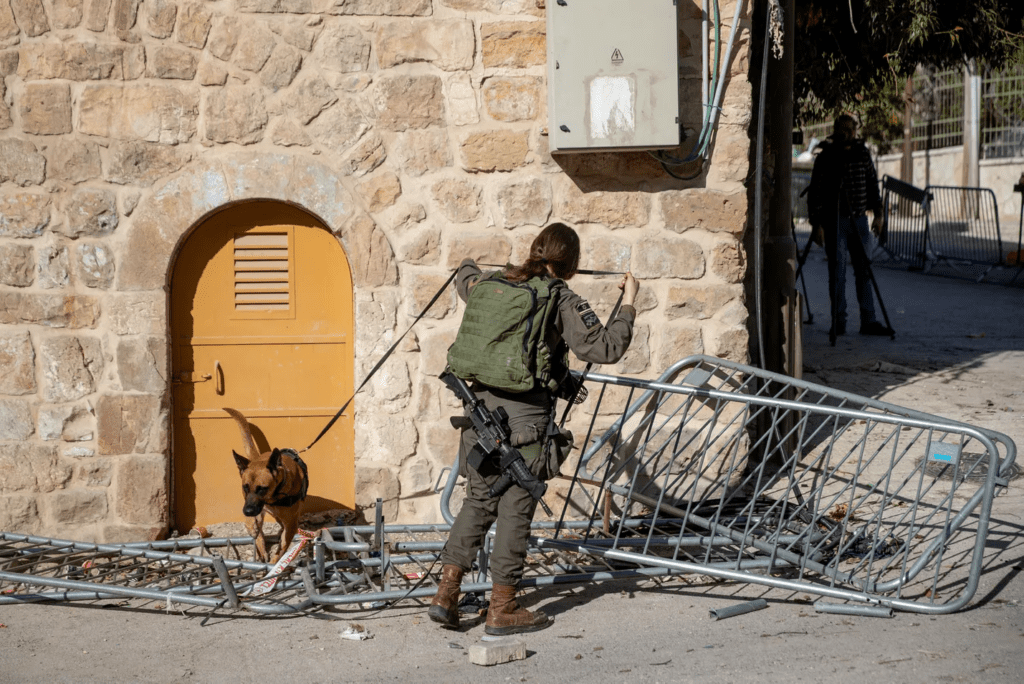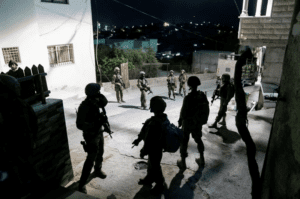During a Hebron raid by Israeli forces, five female family members were forced to undress while threatened by a dog from the canine unit and the soldiers’ rifles.
by Amira Hass, reposted from Ha’aretz, September 5, 2023
Two masked Israeli women soldiers with rifles and an attack dog forced five female members of a Palestinian family to strip naked, each one separately, in the West Bank city of Hebron in July. The soldiers threatened to release the dog if the women did not comply, the family says.
During the raid on the family’s home, male soldiers searched the male family members but did not require them to take off their clothes.
The army had intelligence that there were weapons in the home, and the Israel Defense Forces’ Spokesperson’s Unit told Haaretz that an M16 rifle and ammunition were found there, requiring a search of the house’s other residents.
A total of 26 people, including 15 children from 4 months to 17 years old, live in three adjoining apartments in the Ajluni family’s home in south Hebron. The family says that on July 10 at 1:30 A.M., around 50 soldiers massed around the house accompanied by at least two dogs.
According to the family, about 25 or 30 soldiers took up positions inside the apartments, where they went from room to room after waking up the occupants with flashlights, heavy knocks on the doors and threats that they would break the doors down.
Most of the soldiers were masked, with only their eyes visible. One, who appeared to be the commanding officer and was not masked, was wearing military-issue pants but a regular short-sleeved shirt. The women did not know who he was.
At 5:30 A.M., the soldiers left the house, taking with them the family’s eldest son, Harbi, whom they arrested. The family immediately discovered that gold jewelry that the youngest brother, Mohammed, bought in the run-up to his wedding had disappeared. It was worth 40,000 shekels ($10,500). The men rushed to the Israeli police station in the nearby settlement of Kiryat Arba to file a complaint.
The police said that nothing was stolen, but the following day, an officer phoned Mohammed and told him to come and pick up his gold. The soldiers had thought it was bullets, he was told. The IDF Spokesperson’s Unit says the jewelry was in a black bag wrapped in duct tape that was opened later in an investigation room.
Harbi’s wife, Diala, discovered that 2,000 shekels that had been in a drawer was also missing, but the money hasn’t been returned. The army spokespeople say they are unaware of this allegation.
The women who were forced to strip naked were 53-year-old Ifaf, her 17-year-old daughter Zeinab, and Ifaf’s three daughters-in-law: Amal, Diala and Rawan, who are in their 20s. One by one, they were brought into the small pink and purple bedroom of Amal’s children; a pink teddy bear stands guard.
The first to be called into the room was Amal, 25, who was forced to take off her clothes in the presence of three of her four children, who had just woken up. Crying and screaming and terrified of the dog and the rifles, they witnessed masked female soldiers using hand gestures and broken Arabic to direct Amal to take off her prayer gown.
She removed it. They then demanded that she take off the rest of her clothes. She protested, noting that she couldn’t be hiding anything in her shorts and undershirt. She says they then released the huge dog, which approached her but did not quite touch her.
The children were screaming in fear the entire time. Amal told the soldiers to pull the dog back because the children were afraid of it; she then took off the rest of her clothes. The children also had to witness their mother being ordered to turn around while naked as she sobbed over the humiliation. About 10 minutes later she and the children were taken out of the room pale and trembling.
The second woman called into the room was Ifaf, the family matriarch. She didn’t want to talk much about her ordeal, though she said that the soldiers motioned or ordered her in broken Arabic to take her clothes off. That’s it, turn around, get dressed.
While that was going on, the other members of the family were held in two other rooms in the same apartment. The women and children were in one room and the men in the other. Two or three armed soldiers were stationed at the door of each room and ordered the Ajlunis not to speak.
Occasionally, another soldier would appear and report something to his colleagues. As the family members were held prisoner in the rooms, they heard Amal and her children screaming, followed by the other women doing the same.
They also heard the soldiers rummaging through the adjacent apartments. They heard banging and drawers opening and falling on the floor. They also heard soldiers laughing.

There aren’t many reports of Palestinian women being forced to strip naked during an army raid on their home. In her 15 years as a field researcher in Hebron for the Israeli rights group B’Tselem, Manal al-Ja’bari has recorded about 20 such cases. But she believes that such phenomena at rifle point have increased in recent months. Most of the women refuse to be interviewed by reporters about the trauma, Ja’bari says.
But the women from the Ajluni family agreed to be identified by name if no photos of them were taken. After a woman in the nearby settlement of Beit Hagai was killed on August 21, Ja’bari herself was told to take off all her clothes during a massive nighttime search of houses in Hebron. Ja’bari noticed a camera on the forehead of one female soldier and refused to undress.
“The soldier removed the camera after I insisted. Still, I refused to undress. Maybe because I’m at B’Tselem, they relented,” she said. But the soldiers ransacked her home, broke several items and left such a mess that Ja’bari didn’t know where to start cleaning things up. That’s what soldiers often do, and that’s what they did at the Ajlunis’ house.
Speaking to Haaretz on August 27, the women of the Ajluni family heard from Ja’bari, who was present as well, about her own ordeal. Then they recalled that they had also seen something on the foreheads of the female soldiers but didn’t known what it was. Now, in addition to the trauma of the search, they were tormented by the question of whether the soldiers filmed them naked.
In its statement, the army said that the soldiers were not wearing cameras, though the dog was, but it was off.
At first the women said they were unsure if the female soldiers were masked, but then they concluded that they had to be. “When each of us entered the room, the soldiers moved their hats a bit … so we could see that they had long hair, meaning that they were women,” Diala and Zeinab recalled, one finishing the other’s account.
Among the five women who were stripped, only Amal wasn’t home when the others spoke to Haaretz. She had gone shopping for wedding supplies. Life was resuming; the school year had begun, and gradually smiles returned to the faces of the women and their children.
Ja’bari, the B’Tselem field researcher, recorded the women’s accounts a day after the raid, describing the dread and shock that the Ajlunis would still feel weeks later. For about four weeks, the children were waking up in the middle of the night in fear and were wetting their beds. The women often had the feeling that soldiers were still in the house and jumped whenever they heard a noise outside.

Soldiers outside the house
On the night of the raid, Diala, 24, woke up hearing her husband, Harbi, arguing with someone and demanding that they not come into the bedroom because his wife was there. “I realized that they were soldiers and quickly got up to cover myself and quickly got dressed – in a prayer gown,” she said.
At that moment, soldiers and two large muzzled dogs burst into the room, she said. The three girls who were sleeping in their parents’ room woke up to the sight of the rifles, dogs and eyes peering out above masks.
“My husband yelled at the soldiers – in Hebrew and Arabic – to move away and to move the dogs away. My daughters screamed and cried and trembled with fear. Lujin, who is 4, made in her pants. The soldiers ordered my husband not to talk to me, pointed their rifles at his head and dragged him to the kitchen,” Diala said.
She would only see him several days later, at the Ofer military court, where his detention has been extended several times. He is suspected of possessing a weapon, she said.
On the night of the raid, she and her daughters were left in the bedroom for 10 or 15 minutes; then the soldiers ordered her to walk through the yard to where the entire family had been ordered to gather. It was the apartment of her brother-in-law Abdullah and his wife, Amal. Diala asked that she be allowed to take the money with her from the drawer, but the officer in the short sleeves wouldn’t permit it, she said.
The yard is only partially paved and is full of pebbles, thorns and pieces of glass. The officer wouldn’t let her put shoes on her daughters “and made a sign that I should carry them in my arms,” Diala said. But she only carried 17-month-old Ayla. Lujin and Lida, who is 5, stuck close to her and they went outside.
“I was dying of fear when I went by the dog,” she said. Her daughters trotted next to her, barefoot and crying. She thought there were also other dogs in the yard.
At that point, Abdullah asked for permission to go to the apartment that his brother Mohammed would be moving into after his wedding. Abdullah wanted to get the gold jewelry, but the soldiers refused. He objected, so they handcuffed him from behind, blindfolded him and took him to Diala and Harbi’s kitchen.
They did the same to his 17-year-old cousin, Yamen. The women would find them in the kitchen after the soldiers left with Harbi. They cut the plastic restraints with a knife.
After the soldiers strip-searched Ifaf, it was Diala’s turn. A soldier entered the living room and told her to come with him. “I entered a room, and since I was so afraid of the huge dog, I stayed near the door and tried to get out,” she said. “The female soldiers yelled at me and ordered me to stay in the room.”
When she refused to take off the clothing under the prayer gown, the female soldier with the dog threatened to release the animal. Diala too was required to turn around naked in the soldiers’ presence, and she too cried.
Seventeen-year-old Zeinab rebelled. When the soldiers demanded that everyone hand over their phones, she managed to stash hers under a pillow. She recounted that, while the family members were still sitting in the living room with the children, “a soldier pointed to me, said [in Arabic] ‘You, come,’ and led me to the children’s room.
“The soldiers showed me their hair so I would know that they were female and ordered me to stand in a corner of the room. Then the male soldier angrily pushed the door open, peeked inside, waved my phone, lifted his rifle and aimed it at me. He was upset that I hadn’t turned it over when he said to. I screamed. It was good that I hadn’t yet removed my hijab.”
(At that point Diala interjected that the other women heard her screaming, didn’t know what was happening and were very worried.)
“I thought they would be examining us with electromagnetic equipment,” Zeinab said. “I was surprised when the soldier told me in broken Arabic to undress. I said, ‘What?’ She answered, ‘The clothes.’ I said, ‘I don’t want to.’ She told me, ‘Take everything off.’
“I decided to scream and show that I didn’t have anything on me, and she insisted that I take everything off. When I objected, they came near me with the dog in a threatening way. I heard Diala yelling to me from outside the room that I should do what the soldier said.
“After that, I undressed. The soldier told me to turn around. I only turned halfway around, and then she brought the dog near me again. I was shaking and crying.”
At one point, the children were left alone in the living room without their mothers and in the presence of the armed soldiers. After being searched, the mothers were placed in an adjacent hallway. The children were frightened and cried.
The soldiers partly acceded to the mothers’ requests and allowed them to get the two babies. Ifaf and one of her grandsons say that the soldiers tried to calm the children who remained on their own in the living room. They bumped fists with the small fists of some of the children.
The IDF Spokesperson’s Unit said: “On the basis of intelligence, a long M16 was found, as well ammunition and a magazine. After finding the weapon, it was necessary to check the other people in the house to eliminate the possibility of finding other weapons there. In accordance with instructions from detectives from the Hebron police, female [canine unit] combat soldiers searched the women in the house in a closed room, each one individually. The soldiers were not wearing cameras.
“The dog, which was not present in the room during the inspection, had a camera fitted on its back for operational purposes, and it was not turned on at that time. During the searches, a concealed black bag wrapped in duct tape was found and taken away, along with the weapon that was found. The bag was opened in the investigation room and it was understood that it was jewelry.
“The day after the search, the brother of the arrested man came, signed that it was the family’s jewelry and took it back. We are not familiar with the claim regarding the 2,000 shekels. We are not aware of any complaints regarding the case. If they are received, they will be considered, as is customary.”
Amira Hass is a longtime Ha’aretz columnist.
FURTHER READING:
- The latest in Israel’s strip-searching of women & children
- Stripped, Beaten, and Blindfolded: ongoing violence and abuse of Palestinian children detained by Israeli military
- Israel has been actively covering up a Shin Bet sex crime for years
- Israeli soldiers illegally photograph Palestinian children in middle of night
- Children’s Dreams On Hold Behind An Israeli Military Gate
- When will Israel stop torturing Palestinian prisoners?
- A Scarred Childhood: Israeli Attacks against Palestinian Children in the Occupied West Bank in 2022
- Human rights reports on Israel-Palestine (regularly updated)
VIDEOS:
- WATCH: Israeli police strip, beat Palestinian child at checkpoint
- Flashback: Video about Israeli policy of strip-searching of women and children
- Israel lobby’s false claims of “antisemitism” – Israeli journalist Gideon Levy
- How to buy a politician – and get away with bending (breaking?) the law
- 20 Million Per Day on Behalf of Israel: The Facts





